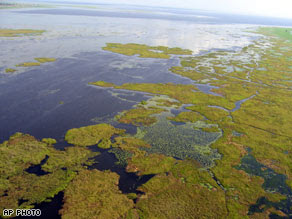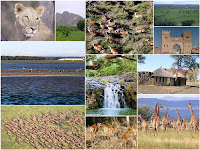Uganda: The Land Of Plenty....
Uganda: the land of plenty? Uganda is indeed the land of plenty of food and water. I write this, with Uganda that was in the 60s and 70s - in mind. Growing up in Uganda then, I never knew what hunger was, till the age of about 12, when - as a Muslim - I started fasting during the month of Ramadhan. Other wise, there always was plenty to eat. Fruits of various kinds, seemed to be every where: mangoes, oranges, papayas, guavas, grapefruits, bananas and berries were then in abundance. As for food served as meals, daily, there was so much (even through all those difficult 70s) that now when I look back and think of those days, I realise how very lucky I was to have had all that abundance surrounding me at that age. And such beauty and peace. The kind of staggering natural beauty that is Uganda, is one of a kind. Now when I read or watch on the news, all the problems and misery that seems to continually be a part of Uganda - I am deeply saddened.
Uganda, being a country of many lakes, rivers and streams; and heavy rains - always had floods. The same places where there are floods now, are the same areas I grew up around: Lango, Teso and Acholi. And even then, there were, many times, floods - some times even bigger than the one we are now witnessing there. Then, roads were flooded and villages and communities were cut off or separated - but, there was no hunger. And there wasn't the kind of misery and deprivation, that seems to be there now. Many, will say it's due to the increase in population, but then:

Uganda, being a country of many lakes, rivers and streams; and heavy rains - always had floods. The same places where there are floods now, are the same areas I grew up around: Lango, Teso and Acholi. And even then, there were, many times, floods - some times even bigger than the one we are now witnessing there. Then, roads were flooded and villages and communities were cut off or separated - but, there was no hunger. And there wasn't the kind of misery and deprivation, that seems to be there now. Many, will say it's due to the increase in population, but then:

.....experts point at El Nino and La Nina to explain the unusually heavy rainfall, deforestation and climate change have exacerbated the problem. Trees absorb the water and protect the soil from erosion. The mudslides in the Elgon region, which have already killed people and blocked roads, are a direct result of the careless felling of trees - for charcoal, wood, or to clear land for agriculture.
Trees also absorb carbon dioxide emissions, released from industrial activities, vehicles and burning of bushes. The more deforestation, the more carbon dioxide accumulates in the atmosphere, causing global warming and erratic weather patterns.But there is more. Greenhouse gases also contribute to flooding, a study published by the journal Nature has found.
Higher atmospheric levels of carbon dioxide reduce the ability of plants to suck water out of the ground and "breathe" out the excess. As a result, less water passes through the plant and into the air in the form of evaporation.
And more water stays in the land, eventually running off into rivers when the soil becomes saturated, and causing flooding. All Africa
The floods only exacerbates Uganda's already many problems: the bloody and costly conflict in the North, it being plagued by HIV/AIDS and other diseases and an economy that has so far not taken off as strongly as hoped for. Now, Uganda has not only to feed and shelter the hundreds of thousands worse affected by the floods, but has too - to reconstruct, rebuild and repair the many roads, bridges and other structures destroyed by the floods. As for the worse affected people of the area, the agony and misery is even more and worse. And will continue for a long time to come; even when the World, much later, has forgotten about the floods in Uganda.
Photo from: CNN


